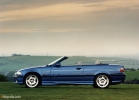Protection of the driver and passenger

Frosting, driver |

Front punch, passenger |

Side blow, driver |
 | - | Fine |
 | - | Good |
 | - | Satisfactorily |
 | - | Badly |
 | - | Very bad |
|
Children's holding devices
| Child up to 18 months |
No information |
| Child older than 3 years |
No information |
Pedestrian safety
 |
 | - | Fine |
 | - | Good |
 | - | Satisfactorily |
|
Comments:
With a frontal blow, the passenger interior of the BMW 3-series has lost integrity, and the driver risked to get a life-threatening breast injury. The degree of displacement of the steering wheel increased even more risk of injury, and solid elements at the bottom of the front panel threatened the knees, hips and the pelvic area of \u200b\u200bthe driver. When you hit the side of the driver's protection, the driver's abdominal cavity did not comply with the requirements of 1998.
Front punch:
With a frontal impact, an excessive displacement of the windshield stand was noted. The passenger salon was significantly deformed, the door was also very damaged, and the supporting beam in the front panel was almost completely separated from the car body. After hitting the driver's door, there was a significant effort. The passenger door opened normally. The steering wheel shifted back by 223 mm and up 14 mm. Also, the collision led to a significant deformation of the niche for the legs, and the brake pedal shifted back by 321 mm. The airbag worked late and could not fulfill its function properly. This, as well as a strong shift of the steering wheel, has increased the likelihood of serious injury by drivers. The neck was protected well. A large load from the seat belt was affected on the chest of a driver, besides, he did not escape the steering wheel with force sufficient to get injured. Inside the front panel and the deformation of the passenger salon increased even more risk for drivers of various components, therefore, the assessment for the protection of the chest reduced. With several other circumstances, the degree of displacement of the front panel could be higher. The left knee of the driver hit the bottom of the front panel to the left of the steering column. Right knee resigned to the panel to the right of the steering column. Lever adjustment of the position of the steering column or front panel bracket can cause knee injury. Significant deformation of the leg niches represents a serious danger to the feet and ankles. After impact, the experts found that the left foot is clamped between the refractory screen and the vehicle floor. The passenger protection is generally good, although the safety belt load can cause damage to the chest.
Security of passenger children:
The safety belt lock does not fulfill its functions and may allow the children's armchair forward. The mannequins were very shone forward, although their heads did not get to the backs of the front armchairs, the younger sensors noted the high risk of getting serious injuries. Instructions for installing seats did not comply with EURO NCAP requirements.
Side strike:
When hitting the head and the pelvic region of the driver were well protected, but the level of breast protection was recognized as weak, and the pelvic department is poor.
Pedestrian safety:
Protection of the child's head. Three of the six control points corresponded to the requirements (above the support of the hood, above the throttle drive housing and on the hood bend line). Two points showed the result above average, and one, above the battery, below. Protection of the top of the legs. None of three points corresponded to the requirements. Places in the center of the front edge of the hood, over the inner edge of the headlights and above its center turned out to be worse than medium. Adult head protection. One point corresponded to the requirements: over the nozzle of the windshield washer. The place above the brake fluid tank showed the result close to the standard, four points is better than the average, and one - above the hood loop - worse. Protection of legs. None of three points corresponded to the requirements, the result of all was below average.
General information about the car
| Roelf location |
On right |
| Tested model |
BMW 316I |
| Body type |
4-door sedan |
| Year of publishing data |
1997 |
| Curb weight |
1225 |
Installation Systems:
| Pretensels of front seat belts |
No |
| Front Belts Load Loaders |
There is |
| Driver Front Airbag |
There is |
| Passenger Front Airbag |
No |
| Side airbags |
No |
| Side Head Airbags |
No |
| Driver's knees and feet airbag |
No |















